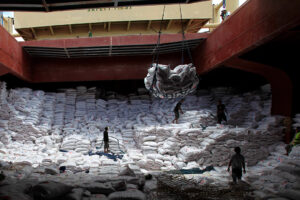Fast-track rice shipment release, Customs told
A CONGRESSMAN on Thursday asked the Philippine customs and ports authorities to expedite the release of rice shipments in a bid to reduce retail price of rice products. The Bureau of Customs (BoC) and the Philippine Ports Authority (PPA) should hire more employees and implement a round-the-clock shifting to hasten the unloading of rice shipments […]

A CONGRESSMAN on Thursday asked the Philippine customs and ports authorities to expedite the release of rice shipments in a bid to reduce retail price of rice products.
The Bureau of Customs (BoC) and the Philippine Ports Authority (PPA) should hire more employees and implement a round-the-clock shifting to hasten the unloading of rice shipments amid logistical bottlenecks due to seaport congestion, Party-list Rep. Wilbert T. Lee said in a statement.
“We need to work quickly and efficiently as every delay in unloading rice cargoes not only adds to costs but also worsens the situation for consumers, especially with inflation,” he said.
Headline inflation eased to 3.3% in August from 4.4% in July due to the slower rise in food and transport costs, the Philippine Statistics Authority (PSA) said last week.
In August, rice inflation slowed to 14.7% from 20.9% a month earlier. This was the lowest rice inflation since the 13.2% print in October last year.
Rice was the top contributor to the August inflation basket, accounting for 32.7% or 1.1 percentage points.
Shipments of rice stock take about “one to two weeks” to be cleared in Philippine ports, resulting in delays that further drive-up retail rice costs, Mr. Lee explained.
Instead of being released to markets quickly to increase supplies and lower rice prices, it has instead become even more expensive,” he said in Filipino, noting the retail effects of the port delays.
Retail prices of the staple grain range between P51 to P60 per kilo, according to the Agriculture department’s latest price monitoring bulletin.
Mr. Lee also pushed Congress to immediately pass House Bill (HB) No. 10426, a measure mandating a round-the-clock government service, which should help in addressing hiccups in the supply chain.
“We need all hands on deck. Increasing the workforce or having 24/7 operations will significantly reduce backlogs and lower the prices of rice,” he said. “A seamless supply chain system, including efficient port logistics, is crucial to ensuring food security and keeping prices affordable. — Kenneth Christiane L. Basilio
















